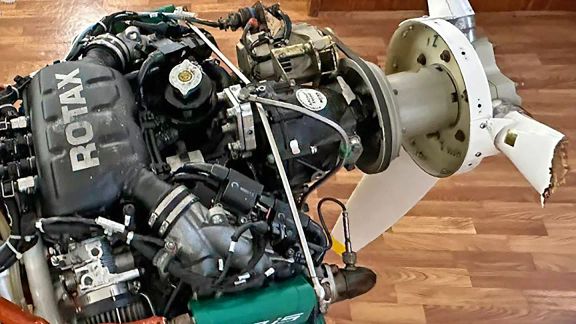Iran Claims Self-Reliance In Making Drone Engines

The Islamic Republic claims it does not need foreign-made parts from to produce military drones, despite many reports revealing the foreign origin of many parts of its UAVs.

The Islamic Republic claims it does not need foreign-made parts from to produce military drones, despite many reports revealing the foreign origin of many parts of its UAVs.
Brigadier General Afshin Khajefard, the chief executive of the Iran Aviation Industries Organization (IAIO), said during a TV program on Saturday night that the country is self-sufficient in the production of drone and cruise missile engines.
"We have reached a level of self-sufficiency in the engine field that today we can produce 10 types of engines in the country, most of which are used on drones and cruise missiles," he said. “Of course, our defense industries have also reached self-sufficiency in designing and making heavy engines,” he noted.
He added that “We have various classes of missiles, precision-strike bombs, electronic warfare avionics and reconnaissance drones. However, we are trying to develop drones with civilian applications, because drones can be used for agriculture, mapping and firefighting."
He claimed that Iran is self-reliant in the field of overhauling commercial aircraft and manufacturing components in defiance of sanctions, adding that the Islamic Republic is also self-reliant in the building and overhaul of helicopters, and many of the country’s manufacturing is domestically made.
Iranian officials are known to make claims about military capabilities that cannot be independently verified.
Iran has developed a program of drones, or UAVs (unmanned aerial vehicles), given it lacks an effective air force due to international sanctions. While Iranian officials and commanders have celebrated this as an achievement of domestic production, Iran has often clandestinely acquired foreign-made parts.
Iran’s Shahed drones, in production since 2013, has been widely reported to have a Rotax 914 engine. A decade ago, there were reports that Iran had copied aspects of a US drone it had shot down.
Quebec-based Bombardier Recreational Products (BRP) expressed surprise that engines made by Rotax, its Austrian subsidiary, were reportedly found in Iranian-made drones shot down in Ukraine. The company’s logo has featured in photographs of drone wreckage. While Rotax engines are used in snowmobiles, watercraft and civilian airlines, they also figure in the United States MQ-1 Predator drone, Israel’s Heron drones, and some Russian drones. Drone output has surged in the Middle East in recent years, with the main producers Israel and Turkey.

After a Rotax engine was apparently found in a Mohajar-6 drone shot down by Ukrainian forces and displayed on CNN in October, BRP stated October 21 it had not given authorization to distributors to “supply military UAV manufacturers in Iran or Russia.”
In January, the BRP, best known for water-skis and snowmobiles, said it has established through a “thorough investigation” set up three months ago that an engine found in a Mohajer-6 drone had not been sold directly to either Iran or Russia. Bombardier ended supplies of the engines to Iran in 2019, although the Mahtabal company in Tehran still markets itself as the official representative for Rotax engines. The date – 2019 – suggests this was a response to the United States 2018 introduction of ‘maximum pressure’ sanctions that threatened punitive action against third parties dealing with Iran. The engines, made primarily for recreational use, would not have been covered by a partial United Nations arms embargo on Iran that expired October in October 2020.
In early-February, dozens of US lawmakers wrote to President Joe Biden to express concerns about reports that Iranian-made drones recovered in Ukraine contain parts manufactured in the United States.
Later in the month, Axios quoted two EU officials as saying that the European Union is expected to impose sanctions on seven entities connected to the IRGC that the bloc believes are involved in the delivery of drones to Russia.
About the same time, the Biden administration expressed concerns about the support countries like Iran and North Korea provide to Russia to supply embargoed goods like microchips. Thea Candler, the Assistant Secretary of Commerce for Export Administration said, “Russia has turned to other countries, if you can imagine the partners of Iran and North Korea, to fill certain gaps in their purchases that have been created by the fact that our products are leaving the Russian market.” Moreover, the United Kingdom has submitted evidence to the UN showing that the IRGC is violating Security Council resolutions. Sources in Tehran told the Guardian last week that Iran used boats and a state-owned airline to smuggle new types of advanced long-range armed drones to Russia.